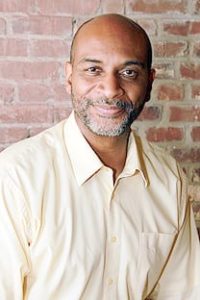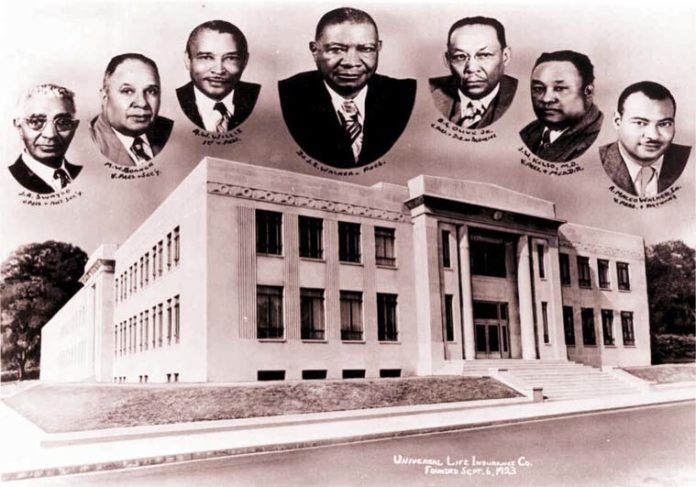

When the oppressive grip of Jim Crow imposed racial prejudice and societal exclusion upon millions of African-Americans across the South, the traditions of collectivism and a deep sense of community created “a way up for blacks.”
“We thrived in a world all our own, with black-owned businesses, black doctors and attorneys, black schools and black churches,” said Jimmie Tucker of Self + Tucker Architects. “Leaders, like Joseph E. Walker, showed our people how to build a community based on faith, education, hope and self-sufficiency so that our children could dream their own dreams of success, and achieve them.”
So what does any of that have to do with renovating an old building? Everything, according to Tucker. “It means everything.”
Self + Tucker Architects is determined to return the Universal Life Insurance Co. building to its former glory, and to revive the “spirit of a beloved community.”
While excluded from mainstream society, “we nurtured our children with love, support and so many positive examples of what was possible when they were committed to God and receiving a good education,” Tucker reflected. “This renovation is more than just restoring an old building. We want to create a space where new businesses are born and a real sense of community lives again.”
The Universal Life Insurance building now boasts new life, thanks to the renovations that have changed the face of its Egyptian revival-style façade. Tucker and partner, Juan Self, are native Memphians who witnessed firsthand what the structure meant to “black people in Memphis.”
“That building meant something to our people,” said Self. “It represented the success and prosperity of an African-American businessman who employed hundreds of people and provided services that others denied. We believe it can mean that once again.”
During the first week in April, Self + Tucker will move their offices in the building, and will invite Memphians to come and view the renovation of the iconic building.
“We want everything about this project to be meaningful in terms of the building’s history,” said Tucker. “The doors will open just as the city and the nation marks the 50th anniversary of Dr. King’s death.
“Timing is everything. The magnitude of this endeavor must be worthy of its historical context,” Tucker added. “That has been very important to us.”
“My mother worked in the bookkeeping department for many years,” said Rhonda Yates. “She retired from there, but I can remember us riding down to the building to pick my mother up from work. I’m really happy to know that building will be open again soon. I see that clock is gone. I hope they will preserve it, along with that neon sign.”
In addition to the architecture offices, the building will be the new home of the downtown Renaissance Center, a city-run office that incubates and assists small business owners as well as those aspiring to be small business owners.
“About 20 percent of the building space will be ours,” said Tucker. “Nearly 50 percent of the total space will be the Renaissance Center where new businesses can be nurtured and launched. Only about 7,000 square feet will be available for occupancy.”
A 100-seat auditorium will be available for business presentations, workshops and training opportunities, said Tucker.
The history of the Universal Life Insurance Co. begins with the roots of Joseph Edison Walker…
Joseph Edison Walker was born in 1879 to farmers William and Maggie Walker in Tillman, Miss., a small town in Claiborne County. His parents saw to it that their children received an education from a very young age.
When he was just 17, Walker moved to Lorman, Miss., to attend Alcorn A&M College (now Alcorn State University), an African-American institution built as part of Reconstruction in 1871.
After completing his undergraduate degree, Walker moved to Nashville to attend Meharry Medical College. He moved back to Mississippi in 1906 to start a medical practice in Indianola. In 1912, Walker became president of the Delta Penny Savings Bank of Indianola.
According to historian Thomas Ward, it was quite common for leadership positions to be considered a natural fit for black doctors because of their revered status in the community. The bank provided loans for home and land purchases, as well as seed money for black businesses.
Five years later, Walker became president of Mississippi Life Insurance Company. Both Delta Bank and Mississippi Life were owned by Alcorn alumnus and longtime friend, Wayne Cox.
Because of their success in the insurance industry, black insurance salesmen were threatened with forced labor and imprisonment during World War I. Bogus “work-or-fight” laws were enacted across the South, but insurance salesmanship was not deemed essential employment.
These tactics, along with violence and intimidation against insurance salesmen, only galvanized racial solidarity and inspired blacks to only patronize an insurance company of their own.
Walker led an expansion of Mississippi Life into Alabama, Arkansas and Tennessee during World War I. In 1920, the company established its headquarters on Beale Street in Memphis. The building became a hub of African-American business success and cultural enrichment.
A few years later when Mississippi Life fell under the control of white administrators, Walker, along with Archie W. Willis Sr. and Mark W. Bonner, founded Universal Life Insurance Co. in 1923, on the second floor of the Fraternal Bank at Third and Beale streets.
Finding financial backers was difficult since Walker was relatively new to Memphis. So he sold shares in the company throughout Tennessee, Arkansas and Mississippi. When the company finally began to grow, its impact on the lives of black Memphians was astounding.
Universal Life quickly expanded into Texas, Arkansas, Mississippi, Kansas, Missouri, Louisiana and Oklahoma.
By 1926, a larger headquarters became necessary, and the company moved into a building at 234 Hernando St. That same year, Walker organized the Memphis Negro Chamber of Commerce and also helped create the Community Welfare League (later became the Memphis Urban League.)
In 1945, Walker’s son, A. Maceo Walker, who was now president of Universal Life, met with the McKissack & McKissack’s Moses McKissack III, to discuss building an expanded headquarters. The use of the Egyptian Revival style was chosen, and related very much to identifying with African culture.
It should also be noted that around this time — in 1946 — Walker and his son, A. Maceo, founded Tri-State Bank to make loaning money to African-Americans easier. In the first 10 years, the bank made $10 million in loans to more than 2,000 families.
In 1949, the Universal Life Insurance Co. building opened to great fanfare at the intersection of Danny Thomas Boulevard and Dr. Martin Luther King Jr. Avenue. It was a monument that sent a clear message of representation of the very best in African-American innovation and entrepreneurship, political savvy and years of resistance to white oppression.
At its pinnacle, Universal Life employed more than 700 people across the South. The enterprise, in effect, served as a catalyst for social equality, business development and prosperity in the African-American, Mid-South community.
The Universal Life Insurance Co. building is now listed on the National Register of Historic Places.




